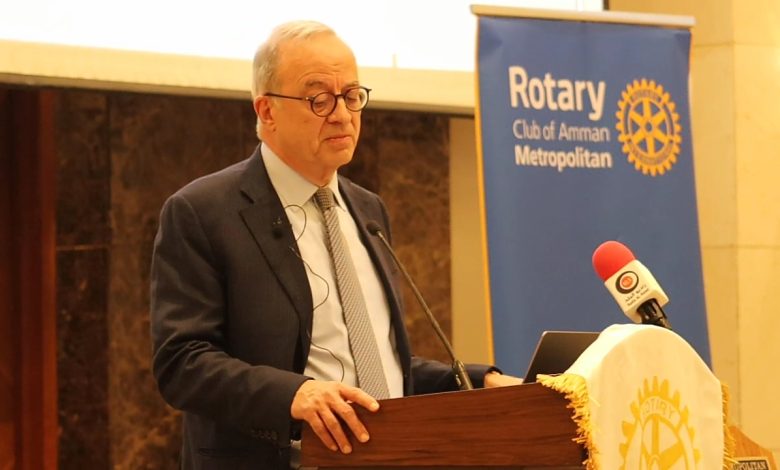
Jordan Daily – In an address to the Rotary Club of Jordan at the Four Seasons Hotel, on Wednesday, Dr. Marwan Muasher, a vice president at the Carnegie Foundation outlined the major challenges facing Jordan in 2025.
His speech highlighted key political and social issues that not only affect Jordan but have implications for the broader Middle East.
Muasher, a former deputy Prime Minister of Jordan concerns center primarily around the potential annexation of the West Bank, which he says poses a serious threat to both Jordan and the Palestinians. “The biggest concern I think Jordan has today is whether the West Bank, in all or part, is going to be annexed as a result of the trends by extremists,” he stated speaking at an event hosted by the Rotary Club of Amman Cosmopolitan Amman Cosmopolitan and nine other clubs. “The forces in Israel today are going to be disastrous, not just for the Palestinians but also for Jordan.”
Muasher emphasized the need for a multipronged strategy to navigate this complex landscape. “We cannot have a confrontation strategy with the United States now,” he said. “We need to find a way to talk to the new administration logically and explain the dangers that such a policy is going to have on the whole region.”
Muasher a former Foreign Minister pointed out that Israel’s recent hardline policies could jeopardize diplomatic relations, particularly concerning the Abrahamic Accords, which aim to normalize relations between Israel and several Arab nations. “If the West Bank is annexed, I don’t see how the Saudis can sign a deal with Israel,” he explained, noting that the Saudis previously hesitated to sign an agreement during the Biden administration due to a lack of commitment to a two-state solution.
The former senior diplomat also addressed the humanitarian situation in Gaza. “Yes, we have a ceasefire, and it’s great—badly needed—but it must turn into a permanent solution,” he emphasized. “A truce is not enough; we need a permanent withdrawal of Israeli forces from Gaza.”
Muasher further expressed skepticism about the reconstruction of Gaza, arguing that without international investment or a political horizon, efforts would be insufficient. “Frankly, I’m not very optimistic about the reconstruction of Gaza. Yes, we will see humanitarian efforts, but if we are talking about reconstructing the infrastructure so that people can stay on their land, not much money is available,” he lamented.
Turning to the broader geopolitical context, Muasher highlighted several systemic issues affecting the region. He noted that while there has been ongoing talk of a two-state solution, none of these the needed conditions are there for its realization. He elaborated on the demographic factor, indicating that the number of Palestinians in Israel-controlled areas is larger than that of Israeli Jews. “If Israel does not succeed in mass transfer, we are dealing with an apartheid system that the international community will not accept indefinitely,” he warned.
Muasher a former ambassador to Washington emphasized that the current situation requires new thinking in how Jordan approaches its relationships, especially given the changing generational attitudes towards Palestinian rights.
Muasher emphasized the need to make use of friends in the U.S. “Jordan has wisely invested in a longstanding relationship with both parties, with the media, with think tanks, and with Congress. It is a relationship that we need to utilize in order to deal with a very hardline administration for the next four years.” He also spoke of a new demographic that must be addressed. “The younger you are, the more likely you are to support Palestinian rights,” he noted, suggesting a generational shift in power dynamics.
Despite the pessimism surrounding the fate of Gaza and the West Bank, Muasher conveyed a glimmer of hope rooted in legal mechanisms. “What we are witnessing today is another legal track, which is the International Court of Justice and the International Criminal Court,” he said. He emphasized that accountability would not only fall on Israel but on all countries engaging with it.
The stakes, however, remain high with the Syrian crisis continuing to challenge the region. Muasher provided three critical lessons from the Syrian conflict, that the “Arab Spring is not over”, and that “brutality does not ensure stability.” He stressed that the removal of oppressive regimes is “essential but not sufficient” for establishing peace and stability.
In addressing Jordan’s role, Muasher urged understanding and support from friends in the international community. “We’re a small country; we cannot do it alone. We need alliances,” he stated, urging for collaboration rather than isolation in addressing the complex crises facing the region.

